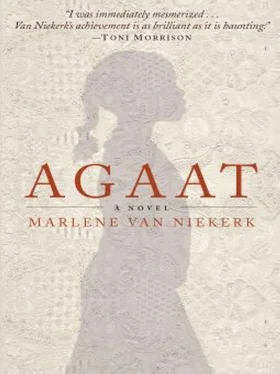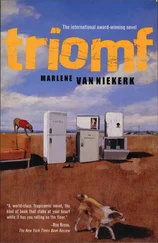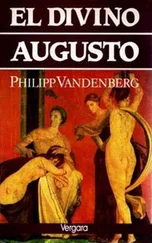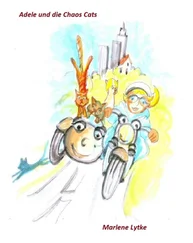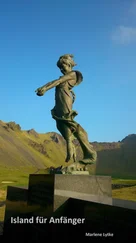But you were hungry and you felt alone. Agaat would be hungry. You wanted to sit at the kitchen table having tea while she made tomato eggs.
At the dam you ordered the dogs, look for Agaat, look!
Itchy goose-down blew up against you. The quacking and gabbling of ducks and geese and smaller waterfowl clamoured as far as the dogs ran and there was a barking and a splashing and a fluttering of wings and a rustling in the reeds before everything became still again. After a while they were back, came and sat by you with gaping mouths.
You switched off the torch. The dogs’ racing breaths made it impossible to listen properly.
Go home, you showed them, get home you two.
What did you want to listen for? A sighing over the water? A weeping in the grass?
Those weren’t Agaat’s sounds.
The brisk untying of apron bands, yes. The intake of breath when she picked up something with the weak hand, the squelching of her rubber soles. But those were all indoor sounds, caught and reflected by floors and walls and ceilings, the sounds of the bright domestic hours. Now the house against the rise with its table lamps behind the curtains looked to you like a glowing coal in the night.
You’d have to listen for a low humming, you thought, or a crackling. Conditions were favourable.
There were still two places where you could go and look, in the poplar grove by the little vlei on the other side of the dam, and on the koppie in front of the house where she often walked.
You didn’t switch on the torch again and on the level ground under the dam wall you found your way to the vlei. There was almost no water in it. You sniffed the air for the smell of fire, but there was only the stench of duckweed and something else, dead cat.
Further along next to the poplar grove the smell got stronger. When you entered the grove, you switched on the torch again and flashed up against the white trunks of the poplars. You tried to imagine, Agaat, swinging from her apron bands, the head with the white cap tilted forward. But it wasn’t an honest image, you thought. You could more realistically expect a blunt object to the head.
What were you thinking? That she’d allow herself to be found by you? To be comforted? What were you really looking for there in the dark? Your whole body was in turmoil. There was a metallic taste in your mouth.
You didn’t see the ditch in time. The torch shot from your hand as you tumbled down the side. You screamed as you tried to find a handhold against the side, but the soil was mushy and muddy and broke up into lumps under your hands. Then you were at the bottom, there was something under your feet, it gave way with a smacking sound, you sank into it up to your ankles. Something crawled against your legs. You screamed again, with long steps tried to get out of the muck. The stench was unbearable. Then you saw the torch lying faintly gleaming.
And it was shining on something that crawled. It took a while for you to make out what it was. The head of a cow, half rotten, with white maggots writhing in the eye sockets and the ears and in the bloated-open mouth and muzzle in which nothing was visible of the gentle expression of the Jersey.
How did you get home? You wanted to escape from your own skin. You ran, a flare of stench.
You got your shoes off, rinsed yourself as well as you could under the jet of the garden hose. There was light in the backyard. You remained standing in the door of the kitchen. You didn’t want to go into the house in your dirty dress.
Agaat didn’t want to see you. She was pouring the milk from the cans neatly into the bottles. She was wearing a clean apron and a new uniform, a fresh stiffly starched cap on her head. The tea cups were set out, you could hear the kettle boiling. She extracted a bottle from the steaming bowl of water by the mouth with forceps and inverted it to drip dry. One, two, three drops in the bowl. Shake, shake, shake.
She looked up. Wooden eye.
Sis, what’s that stink, she said, I’m working with milk here. She looked down and tsk-ed at the bail of the can that kept on falling over her hand as she poured out the milk.
Bring a towel, you said, and my slippers and an old dressing-gown.
The towels, Agaat said with her head in the steam, are in the linen cupboard in the passage, your old dressing-gown is behind the bathroom door, your slippers are in front of your bed.
That was the first time. There had been other times, but never accompanied by words.
You charged at her, you wanted to shake her, you wanted to slap her right there where she was standing with the open bottle of boiling water held out in front of her.
Please, she said to you with a straight voice, her eyes on your cheeks, bring my stuff, please, Agaat.
Put it down, put that bottle down, now this minute, I’m not letting myself be threatened, not by you!
That was what you screamed, wanted to scream, but it sounded like a plea, like please, it’s not my fault.
Then Jak was there in his pyjamas, at the inside door. Agaat carefully placed the bottle on the table. She stood aside, her right hand clenched in the left hand in front of her.
Bravo! Jak exclaimed, bravo! Have we really still not had enough concert for one day? The madam, the maid and the milk. How-manieth act?
He walked to the fridge and poured a glass of milk, tasted and spat it out in the sink.
Sour milk on Grootmoedersdrift, he said, I wish you’d mark the bottles.
She, you said and pointed with your finger.
Jak went and sat at the kitchen table.
So tell the baas what’s the problem here, Agaat? he said.
Agaat remained standing, swayed forward and back on her rubber soles.
She, you said again.
No, Milla, not she, you, you stink something dreadful, look at your dress, where have you been?
The cow, the cow in the ditch in the poplar grove, you cried.
Yes, the stupid cow, walked where she shouldn’t have walked, fell and broke her leg. I had to shoot her.
Agaat moved closer and gathered the full bottles together.
Wait, said Jak, put down, I also want to recite my last lines of the day.
For a moment you thought Agaat was smirking.
My only advice, Gaat, is, don’t let yourself be misled, butter-fingers, a falling fashion, gets lost in the parking lot, gets lost on her own farm, it’s all put on. Mrs Helpless de Wet with the querulous bleat is a costume. Trying to attract attention, that’s all.
Because, and I’m sure you know this, but I’m just reminding you, actually she’s perfectly sure-footed, Queen of the Night, immortal, and she rules the world around here. But you wouldn’t think it, would you, because she always needs something and it’s never enough. Now too hot, now too cold, now too sweet, now too sour. Impossible to please.
Are we heartless, are we cruel, you and I? Then that’s only because that’s the way she wants us. She, my dear little fuzzy foundling, made us, took us apart and reassembled us. Meccano a la Milla. We are power food for her, our fury is pure vitamin. She thrives on it.
So you go ahead and inspect her well for maggots, you’re your nooi’s governess after all, and you know all about maggots don’t you, you know they enter by the soft spots, under the skin and devour you from the inside until one fine day you simply disintegrate and then everybody says, hey, that’s funny, she was never even sick.

from the easy chair to the wheelchair in three months it’s like walking with a tea trolley but without the tea instead of the teapot now Mrs de Wet poked up propped up patched up strapped up in her wheelchair she’s jingling less all the time a dream in a peel a ripple on a pool she is now herself a walking frame on wheels for her nurse her independent living-aid the good old sort she hoists ounooi into it when she has to make the bed and pushes her where she wants her doll by the window doll by the wall doll gazing limply at the floor in the hall sometimes she’s rolled up to where there’s sweeping to be done or peeling it’s better than just having to lie there on her back from wheelchair to wheelchair in less than a year the first chair that she remembers was a spyder from pride mobility products she could propel the high wheels with her own hands the second chair was electrical by redman power chairs with five gears and a joystick hopeful as a courting-candle the third an omega trac full of springs and suspension on which she could drive like an armoured tank over a dam wall the fourth was by permobil an ibot 30-2 a throne on gyroscopes that could climb stoep steps apart from electronics inspired by the purposes of a phantom the last is by froglegs an absolutely ordinary chair because even if she wanted to she could no longer go forward on her own and weaned at last of her hands and her feet and her little wheels she rolls every day like a wash of the sluice with her dreams through the frames and lintels and passages of her house
Читать дальше
